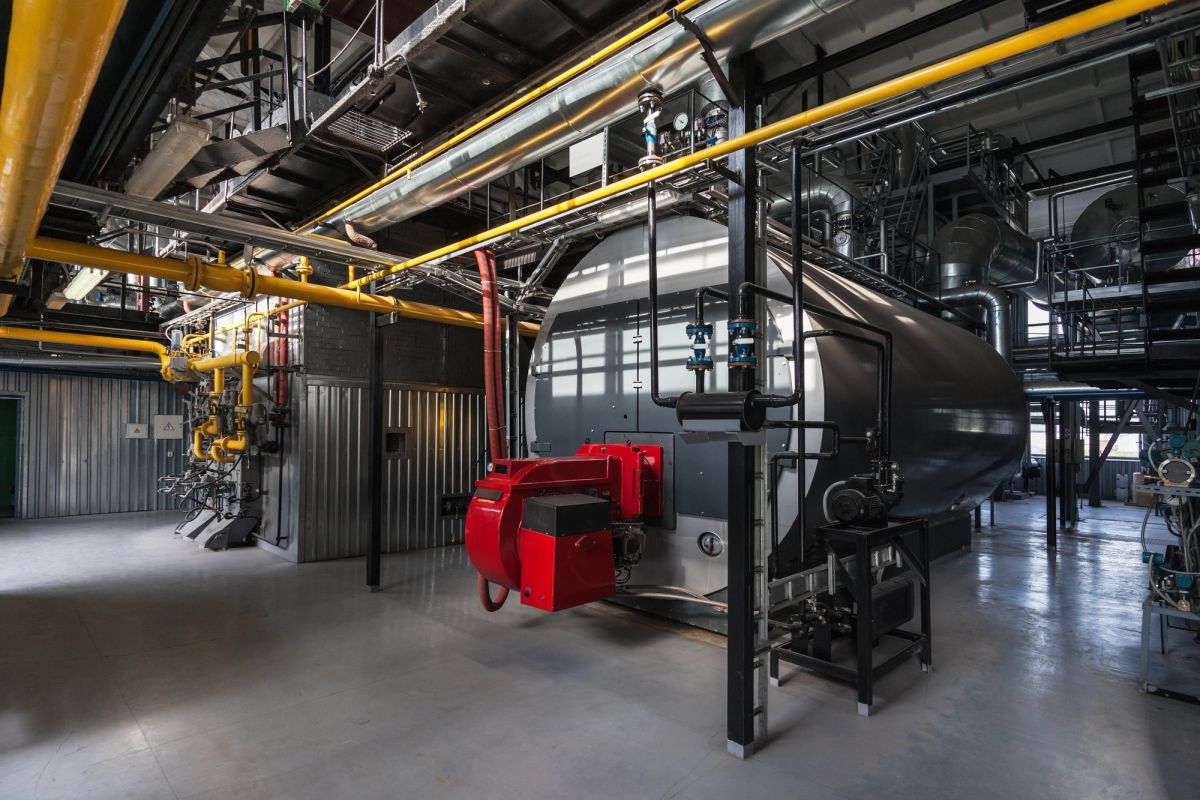The importance of industrial boilers
Industrial boilers play a vital role in many industries by producing steam or heating water for space and process heating, as well as generating mechanical power and electricity. Boilers are highly valuable and important assets. However, industrial boilers traditionally rely on fossil fuels like coal, natural gas, and oil, which are major contributors to greenhouse gas emissions and air pollution.
There are several opportunities for decarbonisation that can help reduce these emissions while also improving boiler efficiency and reducing operating costs. Here, we will explore the benefits and challenges associated with using industrial boiler technology to help industries decarbonise.
What is Industrial Boiler Technology?
A boiler is an enclosed steel vessel that can withstand intense pressure. The hot water or steam, under pressure, is used to transfer heat to where it can be used in heating, cooling, drying, humidification, sterilisation, power generation, and production processes.
Boiler systems can range from small-scale boilers used in small manufacturing plants to large-scale power plants used to generate electricity for the grid. The most common types of industrial boilers are fire-tube boilers and water-tube boilers.
- Fire-tube boilers use heat generated by combustion to heat water and produce steam.
- Water-tube boilers use water to circulate heat generated by combustion.
Both types of boilers have their advantages and disadvantages, depending on the application and the industry.
Top conditions when your organisation should embrace boiler technology
There are several conditions under which it is ideal for a plant to embrace boiler technology, and improve boiler efficiency.
- Plants with high energy consumption
- And high fossil fuel dependency
- When there is need to meet environmental regulations (emissions standards, carbon taxes etc.)
- Plants that have requirements for both heating and cooling systems
- When the opportunity for heat recovery exists
- Requirement to achieve cost savings
- Organisations with sustainability targets
How Industrial Boiler Technology Can Help Decarbonise
Here are some ways to create a more efficient boiler can help various industries decarbonise:
Switch to lower-carbon fuels
Switching to lower-carbon fuels such as biomass, biogas, or hydrogen can significantly reduce greenhouse gas emissions. Biomass and biogas are renewable fuels that can be produced from waste materials such as wood chips, agricultural residues, or food waste. Hydrogen can be produced from renewable energy sources such as wind or solar power.
Improve boiler efficiency
Improving the energy efficiency of industrial boilers and steam systems can also help reduce greenhouse gas emissions. This can include measures such as upgrading equipment, installing insulation, and implementing regular maintenance and tuning of equipment to ensure optimal boiler efficiency.
Implement waste heat recovery
Industrial boilers and steam systems often produce a significant amount of waste heat. Implementing waste heat recovery systems can capture this heat and use it to produce steam to generate electricity, heat buildings, or preheat feedwater. This can significantly reduce energy consumption and greenhouse gases.
Implement cogeneration
Cogeneration, also known as combined heat and power (CHP), involves generating electricity and heat from the same fuel source. This can be an effective way to reduce greenhouse gas emissions by avoiding losses associated with the transmission and distribution of electricity. Cogeneration can also improve the efficiency of industrial processes by using waste heat to generate steam for production processes.
Implement controls and automation
Implementing controls and automation systems can help optimise the operation of industrial boilers and steam systems. This can include measures such as optimising fuel consumption, reducing boiler blowdown, and ensuring that steam is produced at optimal pressure and temperature. By optimising the operation of boilers and steam systems, businesses can reduce energy consumption and greenhouse gas emissions while also improving reliability and reducing operating costs.
Solar-Thermal Systems
Another way to decarbonise industrial processes is to use solar-thermal systems. These systems use solar energy to heat water, which can be used to produce steam for industrial processes. Solar-thermal systems can be used in combination with traditional industrial boilers, which can reduce the amount of fossil fuels used to produce steam.
The challenges of using industrial boiler technology
Capital Costs
The capital costs of installing new industrial boilers or retrofitting existing ones can be significant.
Technical Challenges
Integrating industrial boiler technology with other decarbonization strategies can be technically challenging.
Regulatory Challenges
Installing, operating, and modifying industrial boilers often require specific permits and approvals from regulatory authorities. Navigating the complex regulatory processes and ensuring ongoing compliance can be time-consuming and resource-intensive.
Regulatory agencies may require industries to report boiler-related data, such as emissions, fuel consumption, and operational performance. Establishing robust monitoring systems and ensuring accurate reporting can be challenging.
Health and Safety Regulations: Industrial boilers can pose health and safety risks if not properly operated and maintained. Compliance with regulations related to worker safety, boiler inspections, and maintenance procedures is crucial but can be demanding for industries with limited resources.





